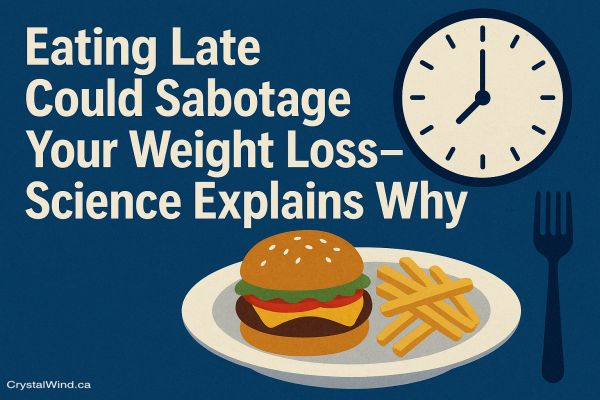Eating Late Could Sabotage Your Weight Loss—Science Explains Why
- Details
- Written by Clara Mendoza
- Views: 9632

By Clara Mendoza | Special to CrystalWind.ca
Murcia, Spain — Ask most people about healthy eating, and you’ll hear the basics: Eat more vegetables, cut back on sugar, watch your portions.
But a growing body of research suggests there’s another question worth asking—when should you eat? It’s a deceptively simple idea that’s getting a lot of attention, especially after a 12-year Spanish study hinted that meal timing could be as important as what’s on your plate. Even more intriguing: For some people, eating late might actually interact with genes linked to obesity.
Is there any truth to this? Or is it just another nutrition fad making the rounds online? I spent weeks digging through the research, talking to experts, and analyzing the data. The answer is more complex—and more interesting—than most headlines suggest.
What’s the “When You Eat” Theory?
Eating is about more than just calories in, calories out. Your body has an internal clock—a circadian rhythm—that controls everything from sleep patterns to metabolism. Some scientists now believe that eating at the “wrong” time of day could disrupt this clock, making it harder to maintain a healthy weight.
This idea isn’t totally new. In Spain, where lunch is the main meal and often eaten as late as 3 p.m., researchers began asking why some people struggled to lose weight even when their diets were similar. The answer might not be just about food choices—it could be about when those choices are made.
The Science Behind Meal Timing
Meal timing isn’t magic. It won’t erase a diet of fast food and soda, and skipping dinner won’t make you immune to weight gain. But there’s real science suggesting that when you eat can influence metabolism, appetite, and fat burning.
Your circadian clock acts like a conductor, coordinating everything from hormone release to digestion. This clock naturally prefers you to eat during daylight hours—when you’re most active—and fast at night. Disrupting this pattern (like eating a large meal at midnight) can throw off metabolism, increase inflammation, and alter hunger hormones.
Shift workers offer clear evidence. They often eat at odd hours and tend to gain more weight, and have higher rates of diabetes and heart disease—even when controlling for other factors. Animal studies mirror this: Mice on high-fat diets fed at night (their rest period) gained more weight than those fed during active hours, even with the same calorie intake.
The 12-Year Spanish Study: What Did It Find?
The landmark study by Dr. Marta Garaulet (International Journal of Obesity, 2013) followed 420 overweight or obese adults in Murcia, Spain. Researchers tracked eating habits, genetics, and weight loss over time.
Key findings:
- People eating their main meal after 3 p.m. lost significantly less weight than those eating earlier, despite similar diets, calorie intake, and exercise.
- Genetics played a role. Those with a variant of the PLIN1 gene, linked to fat storage, were more affected by late meals.
In short, meal timing and genetics worked together to influence weight.
Genetics and Obesity: How Genes Influence Weight
Obesity isn’t just about willpower. Genetics can account for up to 70% of body weight variation. But genes aren’t destiny—they interact with lifestyle habits, diet, and exercise. The PLIN1 gene, for instance, regulates fat storage and release. Certain variants make weight gain easier, especially if paired with late eating habits. Epigenetics explains how lifestyle can influence gene expression, meaning two people eating the same meal can have very different outcomes.
Does Late Eating “Switch On” Obesity Genes?
Headlines may claim: “Late Night Eating Activates Obesity Genes!” This is misleading. Eating late doesn’t literally activate genes. Instead, it interacts with genetic predispositions, making weight management harder for some. Think of it like sunburn: if you’re prone to burning, extra sun hurts more. Similarly, late meals exacerbate genetic sensitivities.
Early vs. Late Eating: Other Research
Global research supports similar ideas:
- Eating earlier, especially a larger breakfast or lunch, is linked to better blood sugar control, reduced hunger, and easier weight loss.
- Skipping breakfast or eating mostly at night is often associated with obesity and metabolic issues.
- Time-restricted eating (6–10 hour eating windows, earlier in the day) may help with metabolism and weight loss.
However, results vary. Genetics, sleep, activity, and gut health all influence outcomes. Some eat late without gaining weight, while others struggle even with healthy dinners.
Practical Advice: Should You Eat Earlier?
No one-size-fits-all solution exists. But for those struggling with weight or with a family history of obesity, experimenting with earlier meals may help:
- Front-load calories: Make breakfast or lunch your largest meal, keeping dinners lighter.
- Stick to a routine: Eat at consistent times daily to support your circadian rhythm.
- Avoid late-night snacking: Give your body at least 12 hours without food overnight, if possible.
- Listen to your body: Shift meals earlier if late eating makes you sluggish or leads to weight gain.
Overall, focus on diet quality, sleep, and exercise. Meal timing is one piece of the health puzzle.
Limitations
The Spanish study is observational—it shows associations, not causation. “Late” in Spain may differ from other countries. Genetics are complex, and scientists are still studying interactions with lifestyle. Most importantly, eating mostly whole foods, controlling portions, and staying active remain foundational.
References
- Garaulet, M., et al. (2013). Timing of food intake predicts weight loss effectiveness. International Journal of Obesity, 37(4), 604–611.
- Jakubowicz, D., et al. (2013). High Caloric Intake at Breakfast vs. Dinner Differentially Influences Weight Loss of Overweight and Obese Women. Obesity, 21(12), 2504–2512.
- Scheer, F. A., et al. (2009). Adverse metabolic and cardiovascular consequences of circadian misalignment. Proceedings of the National Academy of Sciences, 106(11), 4453–4458.
- Ravussin, E., et al. (2019). Early Time‐Restricted Feeding Reduces Appetite and Increases Fat Oxidation But Does Not Affect Energy Expenditure in Humans. Obesity, 27(8), 1244–1254.
- Froy, O. (2010). Metabolism and circadian rhythms—implications for obesity. Endocrine Reviews, 31(1), 1–24.
Disclaimer
This article is for informational purposes only and is not medical advice. Always consult a healthcare provider before making significant changes to diet, meal timing, or exercise. The author is not a licensed medical professional.
About the Author
Clara Mendoza is a freelance science journalist specializing in nutritional biochemistry. She writes for HealthLine, Scientific American, and health tech platforms. When not analyzing studies, she enjoys hiking in Spain and experimenting with plant-based recipes.
© 2025 Clara Mendoza & CrystalWind.ca. All rights reserved. Licensed under CC BY-ND 4.0. Share freely with author’s name, this notice, and a link to https://www.crystalwind.ca. No changes allowed without written permission.
Liked this article? Dive deeper into personal growth and wellness! Check out CrystalWind.ca for spiritual wisdom or explore AromaWorx.ca for natural well-being tips. Spread the positivity—share this with friends on their happiness journey!
Let’s Chat! Drop Your Thoughts Below! ![]()
Disclaimer Health
All post and information provided within this blog is for educational and informational purposes only, and is not to be construed as medical advice or instruction. No action should be taken solely on the contents of this website. Please consult with your healthcare professional before making any dietary or lifestyle changes or taking supplements that may interfere with medications. Any products or information discussed are not intended to diagnose, prevent, treat or cure any illness, disease or lifestyle. Please consult your physician or a qualified health professional on any matters regarding your health and wellbeing or on any opinions expressed within this website.
Latest Articles
Dive into the Mystical World of the Crystal Wind Oracle Deck!
Get All the Enchanting Details Now!
NEW Expanded Boxed Edition!
Now with 58 Cards for Richer Wisdom!

Imagine a world of inspiration and healing, free for all—made possible by YOU!
Donate Now—Ignite the Magic at CrystalWind.ca!

Epilepsy - Finding A Cure
Your donation can make a difference!
Help us find a cure – donate now!
Unlock Your Light: Join Lightworkers Worldwide on CrystalWind.ca!
Follow Us!
Featured This Month
Peridot: The Healer's Stone
Peridot has been used as a Power Stone for centuries. Peridot fosters emotio... Read more
Virgo Mythology
The Virgo Myth In all of constellation mythology, few legends are as misund... Read more
Mabon in Modern Times: Fresh Takes on the Au…
The Mabon season begins somewhere around the 21st-22nd of September and cont... Read more
Mabon Magic: Ideas For Fall Decoration And R…
Welcome (almost!) to Fall! We’re turning the Great Wheel once again, toward ... Read more
Sun in Virgo
An Overview of Sun Sign Characteristics for Virgo Virgo is guided by Mercur... Read more
The Vine: September 2nd - September 29th
The Autumnal Equinox ( Alban Elfed ) Celtic Symbol : The White Swan Read more
Watermelon Tourmaline
Synonym: Rainbow Tourmaline The watermelon tourmaline is a rare variety t... Read more
Sweet Violet
Sweet Violet Faithfulness and modesty. “I will always be true to you.” Helps... Read more
Crystals for Virgo
As the warmth of summer begins to soften into the crispness of autumn, the Sun... Read more
































































































































































